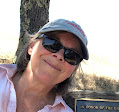I'm very excited to be heading to DC this week for the opening of "Portrait Of Maquoketa" at the Smithsonian's National Portrait Gallery. Artist Rose Frantzen painted 180 portraits of her local townspeople in Maquoketa that will be on display through early July.
I met Rose and her artist husband Charles Morris about a year ago and had the pleasure of working with them over the spring and summer on their book, Portrait of Maquoketa, which is being sold online and will be sold at the Smithsonian gift shop while the exhibit runs in DC.
I met Rose and her artist husband Charles Morris about a year ago and had the pleasure of working with them over the spring and summer on their book, Portrait of Maquoketa, which is being sold online and will be sold at the Smithsonian gift shop while the exhibit runs in DC.
After I conducted a number of interviews with Rose last spring, I wrote an introductory essay for the book and helped her write and edit short reflections about the people, their portraits and her artistic process.
Later in the summer, I listened to Chuck read his essay aloud, which relates biographical information about Rose, discusses some of her other works besides Portrait of Maquoketa, and periodically reveals snapshots of what it must be like to be part of such an amazing marriage of two talented artists. Chuck not only wrote this marvelous essay that ends the book; he also labored on the layout design book all summer long. Then, together with Rose in the late summer and early fall, he saw the book through the many steps involved in the printing process.
The opportunity to work with these remarkable people was handed to me out of the blue from the Freelancing Gods via friend Al T., who thought my husband Chuck would enjoy Rose and Chuck. That's how freelancing can work sometimes -- opportunities sometimes just seem to fall from the sky.
So I'm feeling very lucky today as we prepare to head to DC tomorrow to see the exhibit at the Smithsonian, honor Rose, and celebrate the 180 Maquoketans whose faces will grace the halls of the National Portrait Gallery for the next 7.5 months.
Click Here to Read More..







